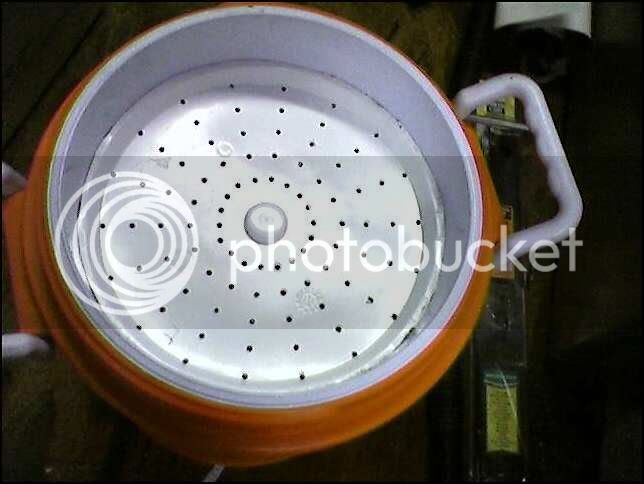I'm a batch sparger. I can predict to within 1 point, my gravity based on a 72% efficiency.
This last batch was a three-peat of my Kona Fire Rock, Pale Ale.
But this time I took a page fom the latest BYO issue, discussing a variation of batch sparging that uses the fly sparge "theory" of washing down the grains by continually adding fresh hot water to the top of the tun and letting that water "squeegy" though the grains and rinse the sugars.
My normal batch sparge consists of:
Slowly drain the tun completely.
Fill tun with 180-185 degree sparge water, stir, let sit for 5 minutes...drain the tun.
Repeat until pre-boil volume is achieved.
This process has consistently yielded a 72% efficiency.
This time I:
Slowly drained the tun, and before the water droped enough to reveal the grains, I gently ladled in (with a sauce pan) just enough water to keep the level 2-3 inches above the surface of the grains. I was essentially manually fly sparging.
Once my liquor tank was empty and I needed to refill/reheat, I close the tun valve and let the mash sit with 2 inches of water over the surface of the grains until I could continue. This would normally be about 15 minutes.
I'd repeated the ladling process, careful not to "pour" the hot water into the tun, but lay the pot into the top of the water and tip it so as to "fold" in the water and not create any channels.
This time, my efficency was 82%.
I knew I was on to something when my preboil volume of 13.5 gallons was just a few point off of my target OG.
So anyway. From now on, I'll not be stirring in my sparge water...but taking the kinder, gentler approach.
So technically, I guess I'm now a fly sparge guy.
NOTE: This erases my notion that going from the round rubbermaid to a wider rectangular would be beneficial to my efficiency. I have to believe that the narrower cylinder shape lends itself more to this method.
This last batch was a three-peat of my Kona Fire Rock, Pale Ale.
But this time I took a page fom the latest BYO issue, discussing a variation of batch sparging that uses the fly sparge "theory" of washing down the grains by continually adding fresh hot water to the top of the tun and letting that water "squeegy" though the grains and rinse the sugars.
My normal batch sparge consists of:
Slowly drain the tun completely.
Fill tun with 180-185 degree sparge water, stir, let sit for 5 minutes...drain the tun.
Repeat until pre-boil volume is achieved.
This process has consistently yielded a 72% efficiency.
This time I:
Slowly drained the tun, and before the water droped enough to reveal the grains, I gently ladled in (with a sauce pan) just enough water to keep the level 2-3 inches above the surface of the grains. I was essentially manually fly sparging.
Once my liquor tank was empty and I needed to refill/reheat, I close the tun valve and let the mash sit with 2 inches of water over the surface of the grains until I could continue. This would normally be about 15 minutes.
I'd repeated the ladling process, careful not to "pour" the hot water into the tun, but lay the pot into the top of the water and tip it so as to "fold" in the water and not create any channels.
This time, my efficency was 82%.
I knew I was on to something when my preboil volume of 13.5 gallons was just a few point off of my target OG.
So anyway. From now on, I'll not be stirring in my sparge water...but taking the kinder, gentler approach.
So technically, I guess I'm now a fly sparge guy.
NOTE: This erases my notion that going from the round rubbermaid to a wider rectangular would be beneficial to my efficiency. I have to believe that the narrower cylinder shape lends itself more to this method.




